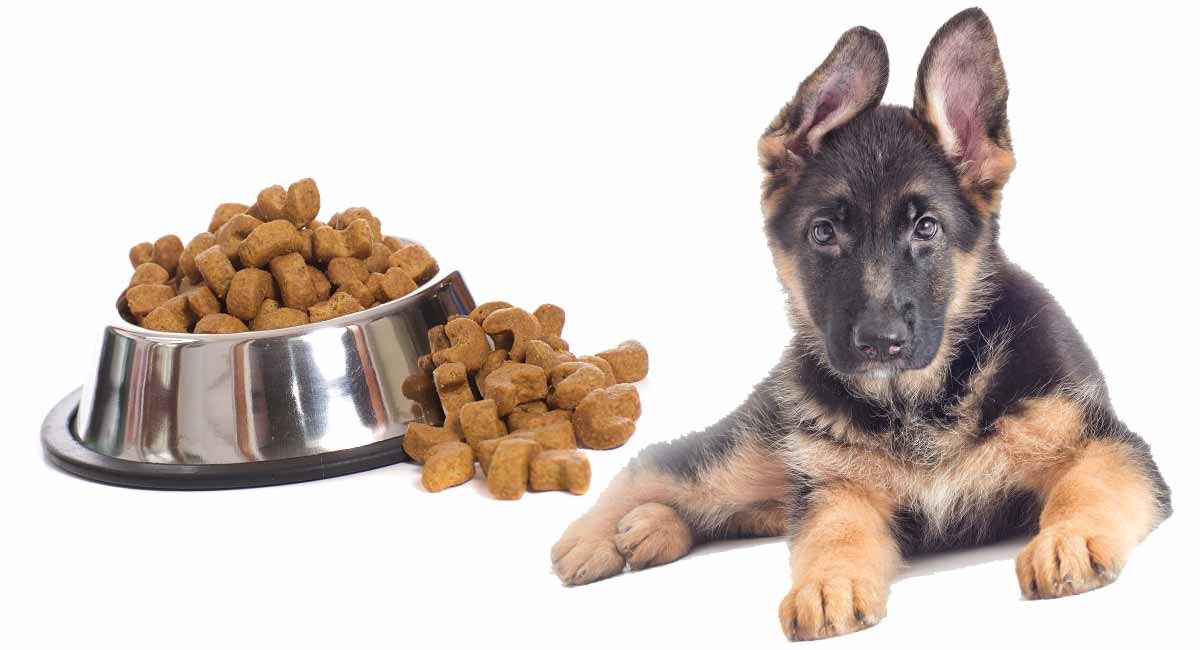Your German Shepherd needs a balanced, nutritious diet to support his active body.
Ensuring that he is fed accordingly throughout his first year of life will help him reach his full potential. The average dog requires 0.5 to 0.8 ounces of dog-specific kibble daily.
So, how much do you feed a German shepherd puppy? German shepherds are large dogs that require a lot of food to grow into healthy adults.
They grow fast, typically eating 4-5 cups of dry dog food a day. A 6 month old puppy needs 2 cups, and a 1 year old needs 3 cups.
A German shepherd will eat less as it grows older, but will still eat around 3 cups of food a day. Keep in mind that this amount varies depending on the dog’s size and activity level.
Puppies need more calories than adults, so feed them more food until they reach full adult size, then feed them less.
German Shepherd Puppy Feeding Chart
Contents
- 1 German Shepherd Puppy Feeding Chart
- 2 How Much To Feed A German Shepherd Puppy?
- 3 How Many Time To Feed A German Shepherd Daily?
- 4 How Much Should A German Shepherd Puppy Eat?
- 5 Understanding German Shepherd Puppy Nutritional Needs
- 6 How Long To Feed A German Shepherd?
- 7 Kibble Vs Wet Food For German Shepherd Puppies
- 8 What If My German Shepherd Puppy Won’t Eat?
- 9 Is A Raw Diet Healthy For A German Shepherd Puppy?
- 10 How Fast do German Shepherds Grow?
- 11 Can You Free Feed A German Shepherd Puppy?
- 12 Should You Feed A German Shepherd Puppy Supplements?
- 13 How Much Should A 1-Year-Old German Shepherd Eat?
- 14 How Much Dry Food To Feed A German Shepherd?
- 15 How Much Water To Give A German Shepherd?
- 16 Pointers For Feeding German Shepherds
- 17 Feeding German Shepherds Guidelines By Weight
- 18 Feeding German Shepherds Guidelines By Age
- 19 How Should You Feed Your German Shepherd Puppy?
- 20 Conclusion
German Shepherd puppies are picky eaters.
They require a special diet of high-quality food to keep them healthy. Here’s a feeding chart showing how to properly feed a 6-week-old German Shepherd puppy.
The puppy requires 2 meals a day for the first 3 months. For the first 3 months, the puppy requires 3 meals a day.
Next, the puppy needs 4 meals a day for the next 6 months, then 3 meals a day for the next 5 months, and finally 2 meals a day for the final 5 months.
How Much To Feed A German Shepherd Puppy?
A good diet is essential for German Shepherd puppies.
These puppies are very active and need a lot of calories to stay active and grow. They usually need 3-4 meals a day.
However, the amount of food depends on the size of the puppy’s breed and age. For example, a large breed puppy will need more food than a small breed puppy.
A puppy needs 3-4 meals a day, with each serving being about 1 cup of high quality food. Then, the puppy should be fed about 3-4 cups of food a day, split over the 3-4 meals.
When a puppy is an adult, the diet should be the same but with an extra cup of food each day. Finally, the puppy should be fed high quality dog food that has been recommended by a veterinarian.
How Many Time To Feed A German Shepherd Daily?
German Shepherds are a large, muscular, and intelligent dog breed.
They are known for their loyalty and bravery. When properly trained, German Shepherds are excellent guard dogs.
German Shepherds are happiest when they have a lot of attention from their owners. They are very active dogs that need daily exercise.
German Shepherds need large yards to run around in or they can become destructive and destructive around the house.
German Shepherds need to eat high quality dog food that meets their nutritional needs.
They also need to eat a lot because they can become obese easily. German Shepherds need to eat at least 3 times a day to stay healthy.
How Much Should A German Shepherd Puppy Eat?
A German Shepherd puppy should start eating solid food within 24 hours of birth.
This food needs to be high in nutrition because German Shepherd puppies need to grow quickly.
They shouldn’t eat too much because their stomachs are small and they can easily become sick from overeating.
The puppy should be fed 3-4 times a day, depending on how much energy it has and how active it is.
It should also be given water at all times, as it grows quickly and needs to keep hydrated.
Understanding German Shepherd Puppy Nutritional Needs
The German Shepherd is a large dog that originated in the 1800s with Germany.
Originally used for herding sheep, the German Shepherd is now one of the most popular breeds in the world. German Shepherds typically live to 12 years of age.
Adult dogs are 24 to 26 inches tall and weigh between 65 and 95 pounds.
German Shepherds have many traits that make them excellent guard dogs, including loyalty, protectiveness, and intelligence.
However, German Shepherd puppies also have many needs that must be met to ensure their health and well being.
The first major puppy nutritional need the German Shepherd has is adequate protein.
The Shepherd puppy’s protein needs increase by 25% around three and a half months and to 50% by six months old.
Protein is needed for muscle and nerve development as well as cellular maintenance.
How Long To Feed A German Shepherd?
A German Shepherd is a breed of dog that originates from Germany. German Shepherds are muscular and athletic dogs that are known for their loyalty and bravery.
Most German Shepherds weigh between 70-100 pounds (32-45 kg), but some larger or smaller individuals exist as well.
Often, German Shepherds are portrayed as fierce, but that’s not always the case.
German Shepherds are actually very loyal and brave animals.
They are also very intelligent and obedient dogs that make great guard dogs.
German Shepherds are known for their loyal nature, which is no surprise considering they originated from Germany.
However, they’re also known for their intelligence.
The German Shepherd is descended from the Molosser dogs that lived on the steppes of Eastern Europe and Siberia in the 19th century.
These dogs were highly intelligent, and that characteristic was passed down to their modern descendants today.
Furthermore, German Shepherds are obedient dogs. They are bred to obey their owners and train well.
Kibble Vs Wet Food For German Shepherd Puppies
Once a German Shepherd puppy turns 6 months old, it’s time to switch him over to wet food.
Kibble was designed for adult dogs, and it’s simply not a necessary part of a puppy’s diet. Although a German Shepherd puppy can eat kibble until he’s 10 months old, it’s best to switch to wet food as soon as it’s available.
This is because wet food has a better nutritional profile than kibble because it contains more protein.
It can also help a dog’s teeth become stronger, which is important as German Shepherd puppies often have problems with their teeth.
Kibble is a better option for older dogs because it contains fewer calories than wet food. However, it’s not necessary for a German Shepherd puppy’s diet.
Wet food is the best option for growing German Shepherd puppies.
What If My German Shepherd Puppy Won’t Eat?
If you’re feeding your dog high-quality dog food and he still won’t eat, the problem is likely behavioral.
German Shepherds are highly intelligent and trainable dogs, so it’s possible he’s simply ignoring you.
Other behavioral issues include separation anxiety and chewing (some dogs do this because they’re bored).
However, if your dog is getting enough exercise and has a clean environment with high-quality food, it’s unlikely that he’s sick or malnourished. If the problem persists, it’s best to consult a vet.
Is A Raw Diet Healthy For A German Shepherd Puppy?
This is a complicated question and there is no one right answer.
However, studies have shown that feeding a raw diet to puppies can be beneficial. Raw meat provides all a dog’s nutritional needs.
It is high in protein and provides all the necessary amino acids. In fact, a raw diet can be safer than a processed diet because many dog foods contain antibiotics and hormones.
On the other hand, feeding a raw diet can be difficult and time consuming. Raw meat can also attract pests and animals.
Overall, feeding a raw diet to a German Shepherd puppy can be beneficial but can be dangerous if done incorrectly.
How Fast do German Shepherds Grow?
German Shepherds are very smart dogs.
However, most people don’t realize how quickly these dogs grow. A German Shepherd puppy can grow up to 4kg in 2 months.
These dogs also grow very quickly in their first year of life. A German Shepherd puppy can grow up to 25kg in 1 year.
It’s very important that German Shepherd owners have a large living space for their dogs.
Otherwise, the German Shepherd owner will have to find another home for their dog.
Can You Free Feed A German Shepherd Puppy?
Many people would like a German Shepherd but not everyone can commit to feeding one every day.
Often, people ask if you can free feed a German Shepherd puppy. This question is a bit tricky because dogs need to eat every day and if you don’t feed them, they’ll lose weight and develop health problems.
However, you can free feed a German Shepherd puppy as long as you understand what you’re doing.
First, it’s good to know how much food a puppy needs. A puppy needs about 30% of its adult weight in food every day.
For example, if you give your puppy 1 kilogram of food every day, it should be eating about 300 grams a day when it grows up. Then, you need to determine how much food your puppy needs in a day.
Generally, the puppy will eat about 2/3 of its total daily food amount in the morning and the rest in the evening. So, you should divide 300 by 3 to get 100 as a morning feeding amount and 100 as a night feeding amount.
You should then divide the daily food amount by 2 to get the number of feedings. So, for example, if your puppy eats 300 grams a day, it will eat 150 grams in the morning and 150 grams in the evening.
Then, you need to feed your puppy at the same time every day so that it becomes accustomed to a regular schedule.
Should You Feed A German Shepherd Puppy Supplements?
There are a lot of supplements that dog owners can buy for their furry companions.
However, should you feed a German Shepherd puppy supplements? The answer is yes and no.
A supplement can be very beneficial for a German Shepherd puppy if it’s given in the appropriate amounts and at the appropriate times. However, it can be very dangerous if given too much or at the wrong times.
For example, some puppies have sensitive stomachs and certain supplements can make them sick. Other supplements can cause malnutrition if they’re given too much.
Therefore, it’s important to carefully monitor a German Shepherd puppy’s diet as it grows to ensure that it’s getting all the nutrients it needs.
How Much Should A 1-Year-Old German Shepherd Eat?
German Shepherds are a medium-sized breed of dog, weighing between 45 and 60 pounds when fully grown.
As puppies, German Shepherds need to eat 4-5 cups of food per day until they are 6 months old.
At 6 months, German Shepherds need to consume 3-4 cups of food per day until they are 1 year old.
German Shepherds are considered adult dogs from 1 to 5 years, at which point they can eat 2 cups per day.
That’s about 3 cups of dry dog food per day for a 1-year-old German Shepherd.
How Much Dry Food To Feed A German Shepherd?
German Shepherds are large dogs that were originally bred as police dogs.
They are very intelligent and loyal dogs that make great pets. However, they can be very challenging to feed.
These animals require large amounts of protein to stay healthy. They also need a lot of calories to sustain their energy levels.
Unfortunately, large dogs like German Shepherds can’t eat the same diet as smaller dogs. In fact, they should only be fed a balanced diet of dry dog food and fresh meat.
They need at least 1-3 cups of dry food per day. However, dogs with a lot of energy may need more food than that.
Be sure to get your dog involved in plenty of exercise or it may put on extra weight and become obese. Overall, German Shepherds are healthy dogs with a lot of energy.
However, they are challenging to feed properly.
How Much Water To Give A German Shepherd?
When a pet owner is considering adopting a new animal, one of the most important things to consider is how much water to give the animal.
A dog needs to drink about 30-40 ounces of water every day. However, some dogs drink more than others.
For instance, a small dog like a Chihuahua may only drink 20 ounces each day, while a large dog like a German Shepherd may drink 40 ounces of water every day. A lot depends on the size of the dog and the type of activities the dog engages in.
For example, a dog that spends most of its time indoors will likely drink less than a dog that spends most of its time outside, playing fetch and swimming.
Pointers For Feeding German Shepherds
German Shepherds are a large breed of dog.
They are known for their intelligence, loyalty, and bravery. These traits make German Shepherds great pets and great working dogs.
However, German Shepherds need a lot of care, including proper nutrition and exercise. Here are a few pointers for feeding German Shepherds.
First, German Shepherds need high-quality protein in their diet. Protein provides amino acids, which dogs use as building blocks for tissue, muscle, and organs.
High-quality protein sources include chicken, beef, eggs, and fish. These protein sources provide dogs with essential amino acids, which dogs can’t produce on their own.
Second, dogs need a balanced diet. A balanced diet includes carbohydrates to provide energy, fats for energy, and fiber for digestion.
Dogs should get about 40% of their daily calories from carbohydrates, 30% from proteins, and 30% from fats. Finally, German Shepherds need lots of exercise.
Dogs need at least 30 minutes of exercise daily. This exercise can be in the form of running or walking, but dogs also need mental stimulation from games and playing with other dogs.
Feeding German Shepherds Guidelines By Weight
The German Shepherd is a medium-sized working dog.
It is a strong and fast dog that was originally bred for herding and guarding sheep. Today it is a popular choice of police and military service dogs.
It is very intelligent and easy to train, but it is prone to separation anxiety if left alone for long periods of time.
Feeding German Shepherds Guidelines By Age
German Shepherd puppies can be fed dog food when they are still small puppies.
Adult German Shepherds eat two meals a day, while senior German Shepherds eat three meals a day. German Shepherd puppies should be fed 3⁄4 of a cup of puppy food per 6 pounds of body weight per day.
Adult and senior German Shepherds eat 1⁄2 a cup of dog food per 10 pounds of body weight per day. German Shepherds should also eat at least one cup of dry dog food per day and drink water.
How Should You Feed Your German Shepherd Puppy?
You have just brought home your new German Shepherd puppy.
That’s very exciting, but your new puppy needs a lot of care. One of the most important things to take care of is feeding your German Shepherd puppy the proper diet.
A properly-fed puppy will be healthy, energetic, and happy. However, overfeeding can negatively affect your puppy’s health.
This guide will help you learn the best way to feed your puppy.
Also Read: German Shepherd Growth Chart: Guides About Height And Weight Of A GSD Dog
Conclusion
Many owners just feed their dogs and cats whatever food is convenient for them at the time. But you should keep in mind that your pets have their own nutritional needs too!
However, now that you’ve read this in-depth guide on how to properly feed a German Shepherd Puppy, you should have no problem giving your furry pal the best food possible.
After discussing a German shepherd’s feeding quantity, frequency, and lengths, we’ve also listed down some brands you can check out as well!
You even learnt how to tell if your dog is overweight or underweight.
Along with the German shepherd feeding chart, you also learnt about the different types of dog foods available for your pet.
Finally, we discussed the nutrition requirements of a German Shepherd Dog – how many calories they need on a daily basis and how to feed your canine companion based on his breed and age.
After all of this, you should now have an idea about the proper amount of food to give to your dog.
A future with a healthy pet is always a great one.




